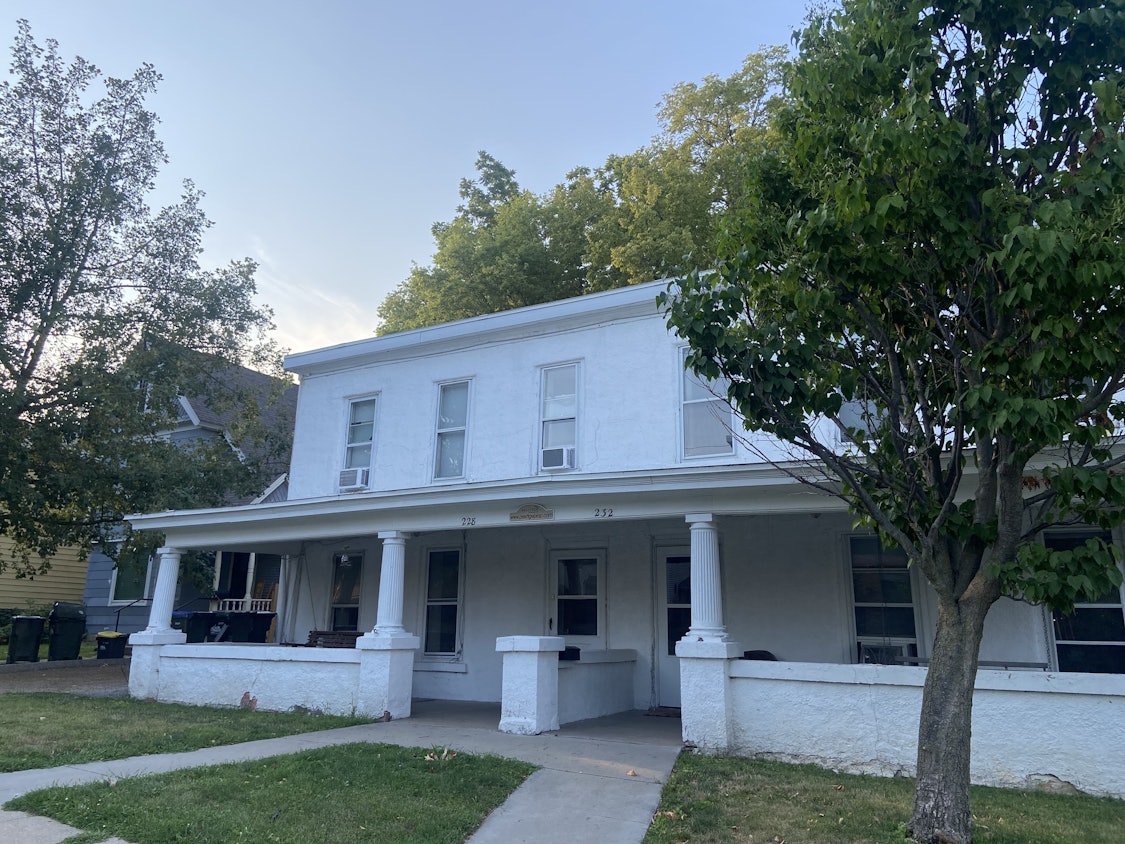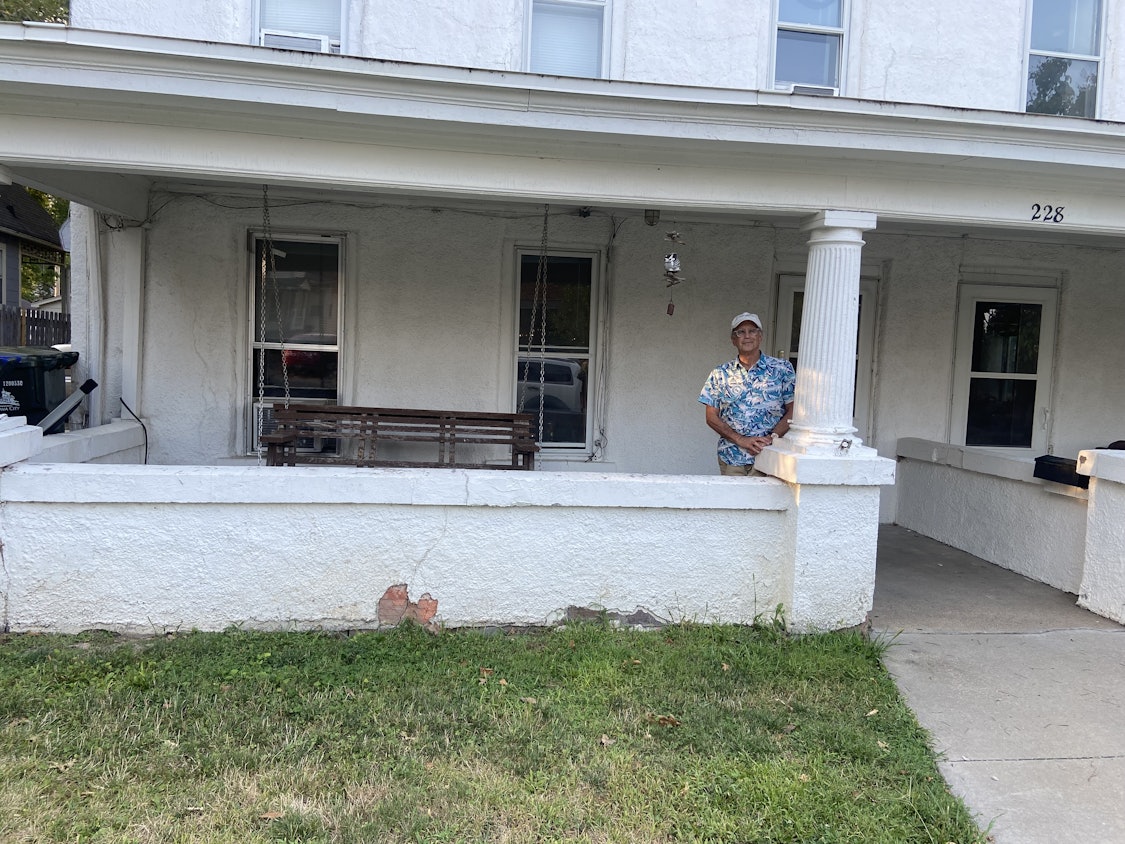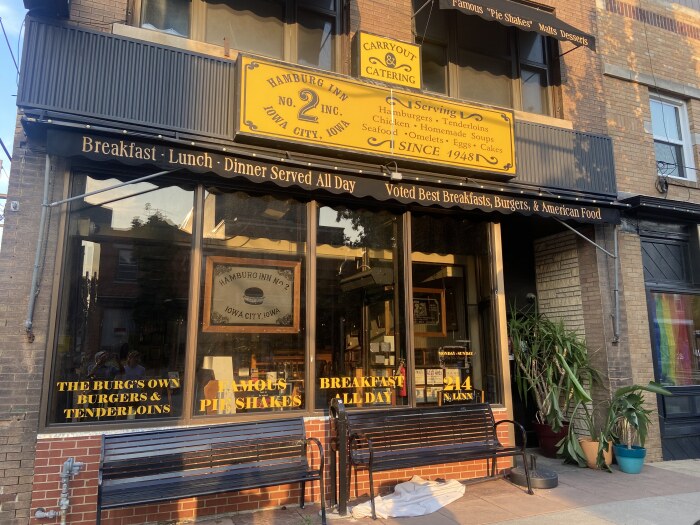Dave Leshtz is the editor of The Prairie Progressive.
228 E. Bloomington Street in Iowa City was a battered old duplex across the street from Tweedy’s grocery store, the future site of Pagliai’s Pizza. The elderly landlady lived in one half of the duplex. I lived in the other half with a married couple and their baby, plus whoever needed a bed for the night or the week or the month.

A block south on Linn Street was the Hamburg Inn #2. The year was 1967, and the Burg was in its pre-caucuses heyday. I ate breakfast, lunch, or dinner there almost every day.
The customers were vividly eclectic: hungover fraternity brothers, young couples who obviously had spent the night together, lawyers with nearby offices, small-time gamblers, alcoholics who had trouble lifting that first cup of coffee to their lips without spilling, poets, and house painters.
Sitting side by side were Hawkeye athletes, bankers in suits, the grey-skinned brothers who lived nearby in a coal-heated shack, chain-smokers conversing with themselves or with their invisible companions, Regina and City high school kids, a growing number of smiling potheads taking a long time to order, and families who had been eating there for the nearly twenty years the Panther family had owned the place. Servers were equally diverse, although older and less tattooed and pierced than the staff of the future.
Charlie Woodbury was a graduate student from Wyoming who painted monstrous yet beautiful portraits of his fellow acid heads. One spring day Charlie, living on my side of the duplex at the time, dropped a tab at 10 AM, strolled over to the Hamburg Inn, and sat in a booth until 10 PM, drinking coffee and observing what he called a cavalcade of cheeseburgers and colorful customers.
He was not the only one—high or not—to spend entire days at the Burg, observing shift changes, listening to shouts from the kitchen, speculating who was or would be screwing whom, sharing a booth with friends or strangers, scribbling or sketching, and eating chili, blueberry pancakes, tenderloins and fries.
Bill Shannon was a frequent visitor to the duplex, usually bearing chemicals he had purchased or concocted in his father’s university lab. I asked him once if some of those chemicals destroyed brain cells. “By the millions!” he replied ecstatically. One evening Bill flipped out on homemade DMT. It took an emergency take-out order of a grilled cheese with pickles from the Burg to calm him down.
Gradually the denizens of the duplex drifted off to jobs and jail and unknown towns and cities. The married couple I lived with absconded for San Francisco with next month’s rent, leaving me homeless until finding a cheap apartment at the Clinton and Washington Streets crossroads in downtown Iowa City, across from Whetstone’s drug store.
I soon left town, too, only to return for good in 1976. The Hamburg Inn once again became a regular stop for me (although the milk shakes were considerably better at Pearson’s drug store five doors south). Friends and family visiting from out of state insisted on eating there, as they insisted on browsing at Prairie Lights Books, photographing each other in front of the giant sloth at MacBride Hall, and communing with the Black Angel at midnight.
Jimmy Carter gave Iowa national political importance by finishing second to Undecided in the caucuses in 1976, but the Burg’s significance on the world stage didn’t arrive until 1992, when Ronald Reagan dropped in for pie and ice cream at the two-seater table closest to the kitchen. (Local resident Carl Schlueter declined to shake Reagan’s hand as he walked by.)
Almost every year since then, a panorama of politicians has paraded through the little diner, some to shake hands, some to eat, some to hold a press conference, and some to talk University of Arkansas football, as President Bill Clinton did with my friend Gary Sanders in 2003. Barack Obama held a crying baby in his arms there in 2007, before speaking to a huge Earth Day crowd on his way to the presidency.
By then I had become heavily engaged in local and national politics. Working for Howard Dean in 2003, I arranged and accompanied him on his mandatory Hamburg Inn stop. Accustomed to serving presidential aspirants, the restaurant staff had become a jaded, slightly amused crew, deftly working their way around handlers and media. Governor Dean was a big hit with them, especially for stopping to thank and chat with the kitchen workers on his way out the back door.
For several years I worked for U.S. Representative Dave Loebsack, already a Burg regular but even more so as a member of Congress. Every election year, totaling seven, we held a meet-and-greet there. Owner Dave Panther and manager Seth Dudley went out of their way to accommodate us.
It was during Loebsack’s sixth term in office that former University of Iowa student and Chinese entrepreneur Michael Lee bought the Burg. Dave Panther was ready to retire and was happy to oblige Mr. Lee by meeting with him frequently and taking his many phone calls after the deal was done.
Mr. Lee was a cheerful but forceful businessman who had a scheme to open Hamburg Inns all over the U.S. To explain his scheme, Mr. Lee hosted the congressman and his staff at the Burg, embarrassing us by loudly ordering staff to give us special attention. His two young assistants often shrugged or winked at me, as if to say, “That’s just Mr. Lee.”
The Hamburg Inns planned across the country, Mr. Lee told us, would be owned by wealthy friends of his in China, enabling them to obtain EB-5 visas. EB-5 visas allow foreign business owners to gain conditional residency in the U.S., with a pathway to permanent residency. Mr. Lee wanted the congressman to meet with some of these prospective owners and to publicly endorse his plan.
Each time we met with Mr. Lee we were given gifts made in China: a model of a sailing ship, a scarf, a scroll of artwork. Despite our protestations, he even had his assistants drop them off at our office in downtown Iowa City.
I finally said to him, “You can’t keep doing this. It might be how you do business with politicians in your country, but it’s unethical if not illegal in our country. We simply can’t accept all these gifts.”
His response: “They are not gifts. They are souvenirs.”
A couple of times we met with Mr. Lee and a visiting entourage of six or seven well-dressed businessmen in a conference room near our office. Whenever the congressman said something that Mr. Lee liked, he would clap his hands and nod vigorously. Instantly the members of his entourage, most of whom spoke little English, did the same. Once, when Loebsack said something he really liked a lot, Mr. Lee sprang to his feet and clapped wildly. His entourage jumped up and applauded with equal fervor.
The souvenirs finally stopped piling up in the corner of my office, and Mr. Lee’s invitations and entreaties to meet with the congressman tapered off as he came to understand that we were not going to enthusiastically promote his visa scheme. Hamburg Inn staff, accustomed to the Panther family’s laid-back management style, had difficulty working for a more authoritarian and demonstrative owner.
When COVID-19 hit in 2020, Mr. Lee took cover in his home in Taiwan. Most of the experienced staff soon left, and those remaining were pretty much on their own. Thus, a legendary diner and Iowa landmark slid sadly into decline, with only a few loyal regulars putting up with higher prices, lackadaisical service, and competition from new north side eateries and bistros (as well as George’s Buffet, a cheeseburger-serving tavern around the corner – a legend in its own right). Gone are the long lines on Sunday mornings, the bantering with veteran waitstaff, the political meet-and-greets and the caucus coffee bean poll.
Passing by that battered old duplex on Bloomington Street, I can see myself talking and listening to music late into the night with friends long since died or disappeared. The rudderless restaurant one block south survives, closing and re-opening in fits and starts, still serving meat loaf, omelets, and memories.
Now, on this hot July day in 2023, a sign has been taped to the door of the Hamburg Inn:
WE ARE TEMPORARILY closed until further notice.
As former regular customer Kurt Vonnegut, Jr., might have said, “So it goes.”
Editor’s note: In 2016, the Iowa City Press-Citizen published a photo gallery of the Hamburg Inn over the years. All photos shown here are by Dave Leshtz and published with permission.
Sign informing the public the diner was closed until further notice:

Dave Leshtz on the porch of the duplex where he once lived:



2 Comments
Steve Siegel, Ottumwa
Dave Leshtz has written a beautiful remembrance of the Hamburg Inn #2.
He knows what he is saying about Iowa City, as he has lived it. The apparent demise of the Hamburg Inn follows the demolition of the Mill, another Iowa City tradition.
Both businesses embodied to some extent anyway, the 1960’s ethos of Iowa City.. There still remains some of that ethos (Prairie Lights, Gabe’s (of Gabe and Walker’s).
And thanks to Dave and others like him, Iowa City as a whole is much more progressive now than it was in the Sixties.
sj_siegel@yahoo.com Sat 19 Aug 9:34 PM
Thanks
Oh, Dave. This is wonderful. Fine writing inspired excellent memories. So sad about the present state.
iowamimi Sun 20 Aug 10:15 AM